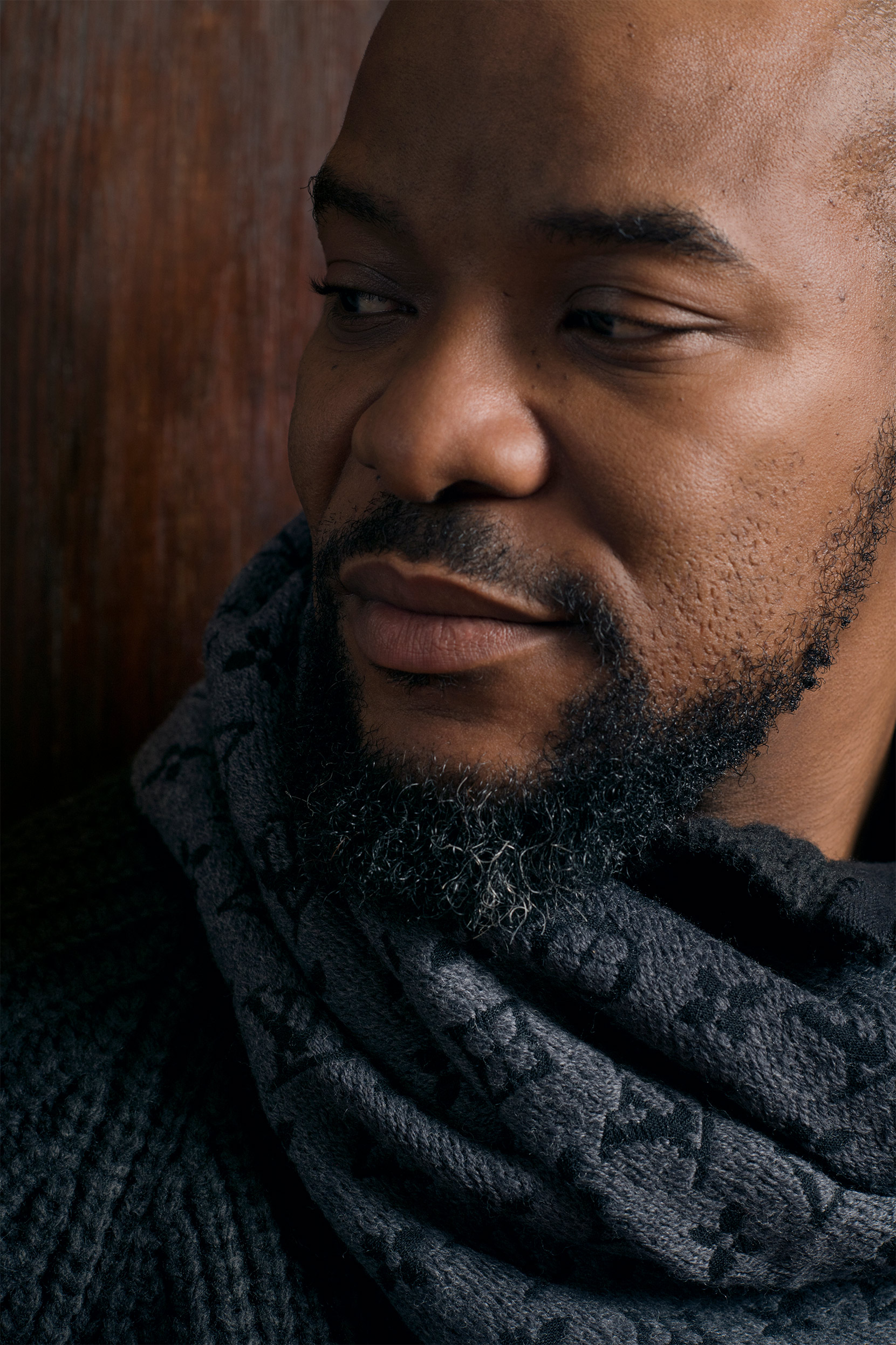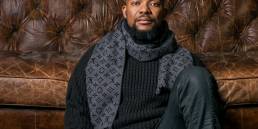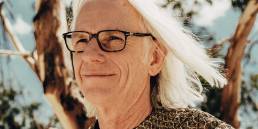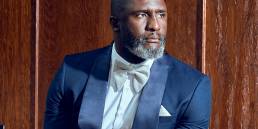There was a time when multi-talented film & tv practitioner Hlomla Dandala would approach local media in order to highlight the part he played in an Emmy-award winning directing team. As was the modus operandi then, media reacted unfavorably to content that did not relate to his personal life.
That was then.
Today, Dandala’s ever evolving identity lends itself from the words of Athenian philosopher Plato who said that the life that is not examined is not worth living. This seasoned lead actor finds himself at an age where he comfortably leans into the truth that his legacy speaks for far more than what any media platform may claim to know. This realization comes after consistent moments of Dandala examining his own life and seeking the substance of it – quite an undertaking for someone whose opinion of themselves could very easily be marred by that of subjective public opinion.







If it is indeed true that being male is a matter of birth and being a man is a matter of choice where manhood is the defeat of childhood narcissism, then Dandala has emerged victorious. Dandala has chosen not only to stand in his manhood but also to be steered by the choice of defining what qualifies his legacy himself. A significant part of that qualification is his affinity towards always seeking the truth and standing for it.
Dandala identifies the source of his appeal to the truth as being what a boy child tends to identify as the first instructor of the truth, a Dad. In this instance, it’s Cambridge University graduate Mvume Dandala, the former presiding bishop of the Methodist Church of Southern Africa. “You can’t learn lessons until you live on the edge of your truth. I get my inability to walk past a truth from my Dad”, he says.
Dandala being a father himself has amongst his children, 3 sons whom he too chooses to guide. This choice reiterates the meaning of the truth that one father is more than a hundred schoolmasters because if boys don’t learn, men won’t know. True to the man that he is, Dandala has chosen to father his sons and daughters with a selfless approach that prioritizes identifying with the purpose of the name they carry over the popularity it may come with. He says, “I work very hard to ensure that the kids see me only as Dad. I don’t want my kids to walk around saying “I’m Hlomla Dandala’s kid”. They must earn it. They are not allowed to be famous until they earn it.”
We meet Dandala at a time in his career and at a time in the industry when there is a greater call on the elders amongst us to share what’s of most value to the youth trying to edge their way in the industry – be it through copious auditions, pursuing degrees or leveraging social media to open up the industry themselves.
As a seasoned lead actor whom we’ve enjoyed through roles such as Derek Nyathi on SABC 3’s Isidingo, Chief Jacob Makhubu Abayomi on Mnet’s Jacob’s Cross, Kingsley Siseko Langa on etv’s Scandal, Lethu “Lala” Dikana on 1 Magic’s The River or roles in films such as Winnie Mandela, Eternity and Madiba just to name a few, Dandala’s depth of skill allows for him to hold an audience for learning with the young, hungry and talented who have a sharpened focus to become the best in skill with fame being a by-product as opposed to the goal. As his word of advice, he states, “What creatives require is talent but if that talent is not undergirded by skill then it creates problems. My usual response is walk the line – iyafundewlwa (this is a learnt skill) …what we do comes with the cloud of fame and it’s very easy to mistake the two. That you’re famous does not make you a good actor. That you are a good actor doesn’t make you famous. If you treat it as a calling, you’ll treat it as that and put in the work.”
Dandala has not only walked the line, he has done so without missing a beat. Throughout these roles such as those mentioned above and a host of many others, he has managed to achieve the rare skill of preserving his identity. Throughout the years that we’ve shifted with him from role to role, even though Dandala may be revered as Jacob, remembered as Derek or recognized as Commissioner Dikana, the top-of-mind description one would have of him, is simply him as Hlomla Dandala. That in itself is a skill that extends beyond the learnings from any production set or drama degree qualification.
Of this quality that stands out so profoundly about him, Dandala says, “When you do something really well, it’s always expected. For the past 10-15 years, every new role has been hated for a month. People engage you looking for what they saw before – so it’s easy to get typecast. The ability to not be typecast or to remain Hlomla Dandala is not a skill, you have to work at it. I was advised immediately after I left Isidingo. Someone said to me if I don’t create Hlomla Dandala, I will be Derek Nyathi until I die, so I should go the extra mile. Then I got lucky and that’s where things like All You Need Is Love happened and I was able to craft my identity.”
A platform that also helped Dandala craft this identity is social media, in particular Instagram and Twitter. Through the former we experience him as a doting Dad while the latter is a platform which he uses to be a voice of the voiceless who charges his opinion on any issue of domestic, continental or global debate. This charge is off-set by an interesting Twitter handle which is his name but staged as The Literate Lion, underpinned by the byline – “The story of the hunt will be retold”. As someone who has experienced years of traditional media highlighting his private life more than his professional contributions, Dandala understands the benefit of new/social media in that it is the first media platform to not be policed by those with agendas other than the agenda of people using such platforms to engage. In many ways, social media enables one such as Dandala to lead the narrative of his true identity and somewhat brand whatever media report may emerge of his private life, null and void. Until one has heard from the literate lion himself, whatever is written by a journalist is not qualified. What is better yet is that the inspiration behind this identity is intended to speak to a greater objective than himself alone. Dandala is an advocate for the preservation of the African identity, in all its aspects. Inspired by the Nigerian proverb, “Until the lion learns how to write, every story will glorify the hunter”, Dandala elaborates on his chosen social angle by saying, “With social media, it’s very easy to buck an expectation…That’s why with my Twitter handle, I have this platform and I’m going to speak my truth through it.”
One of the truths he’s fond of expressing is his opinion on the state of this African identity as he says, “My favourite book is Capitalist Nigga (C. Onyeani, Timbuktu Publishers, 2000). It speaks a certain truth which we as Africans are afraid to face. We are the only people whose highest aspiration is material. We keep aspiring to having the results of the economy – the house in Sandton is not the economy and car are not an economy. We keep chasing the results of somebody else’s economy. A real economy happens in your head – it’s looking at a tree and seeing furniture, medicine, utensils etc. that you can supply for others. We do have amazing examples though – the taxi economy is ours”.
For someone with such a rich legacy to reflect back on, one would think that his fame propels him to leverage the social media space and that it drives him at a deeper level. In truth however, this qualified craftsman has chosen to remain far from the glare of what fame requires as he states, “I’ve never liked the fame. I’m terrified of the fame. I grew up with a recurring nightmare that I grew up on stage with a spotlight on me. I don’t like it. I’m scared of it. I’m scared of what it does to you. I don’t care how centered you are, if enough people tell you how amazing you are every single day for years at a time, at some point you’ll believe it and the moment you believe it, you’re in trouble. If you don’t recognize it for the drug that it is, it will kill you. The Kardashians are an amazing example of what you can do with fame. Except, for every Kardashian family, there is a family addicted to drugs.”
As our conversation draws to a close, Dandala expresses his thoughts which don’t glorify his fears but rather extend to that which he has faith in – the industry and its potential. On it Dandala says, “Film is important. It still remains at the cutting edge of the arts – Game of Thrones is doing what The Lord of The Rings was doing ages ago…My hope for the industry which extends to the rest of the country is that we are able to access our audience. In South Africa, we all can’t access our audience through our movies. One day, when we say that a film is being released, it will be within walking distance of every single African.”
If that wish of one of our greatest leading literate lions qualifies as the truth of our film & tv industry’s potential for expansion, then we are still in for a great ride.
Credits: Photographer: @ingridalicephotography Assisted By: @theoneandonlywanderer Retoucher: @retouch.by.kay Hair Designer: @iambomzi Fashion Director: @karinorzol Location: @emoyeniparktownthebar. Magazine
thebar. is an online magazine, concerned (read: obsessed)
with the local and international film industries.
Our purpose is to elevate these industries and their leaders
by showcasing high quality, breakthrough content which
elicits a strong response from those working inside
the industry and outside it.
Related Posts
3rd Jun 2019
Hlomla Dandala – The Truth Of A Qualified Craftsman
This June, we journey with a maverick…
30th Oct 2018
The multifaceted man of God: Diving to the core of Muzi Mthabela
The name Muzi Mthabela comes with many…



